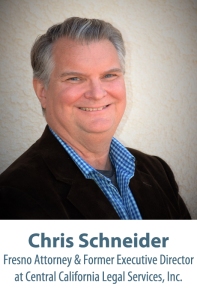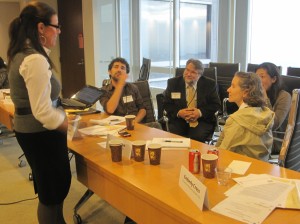Rural Immigrant Connect launches its first pilot case.
Over the past few years, the number of human beings fleeing horrifying violence in parts of Central America and Mexico for the U.S. has escalated dramatically. In 2014, the number of women crossing the U.S. border multiplied by more than three times compared to 2013, while the number of separated or unaccompanied children reached over 66,000 in 2014, up from an average of 6,775 children in the years 2003-2011. This stream of refugees fleeing Central America and Mexico has not ceased, and many arrive in California on a daily basis.
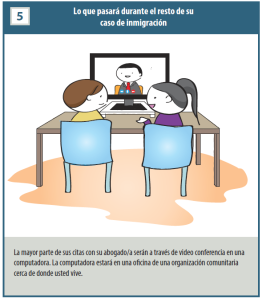
Image explaining to clients how Rural Immigrant Connect works.
Unfortunately, arriving in the U.S. is only half the battle — not only do immigrants face constant worries about family left behind, but many are placed into deportation proceedings in immigration court, where even very young children are not guaranteed a lawyer. It’s even worse for immigrants who reside in California’s Central Valley, a region with few legal organizations offering services within its vast geographic expanse.
The need for innovative models to connect pro bono attorneys with immigrant clients in rural California has never been greater. Through a generous Equal Justice Works fellowship sponsored by the law firm Fenwick & West LLP, OneJustice recently launched the project Rural Immigrant Connect, putting technology to creative use by connecting pro bono attorneys in the Bay Area with immigrant clients in need in the Central Valley.
Rural Immigrant Connect addresses the dearth of legal representation for low-income immigrants in the Central Valley by tapping the resources of the Bay Area and Silicon Valley, home to law firms and corporations that can provide an incredible amount of resources to serve Central Valley clients. To bridge the geographic gap, the project uses videoconferencing for the majority of communication between pro bono attorneys and clients, following an initial in-person meeting. In addition, OneJustice places laptops at community organizations in the Central Valley to provide clients with easy access and in-person technology support.
Thanks to the wonderful work of Fenwick & West LLP attorneys Vikram Iyengar and Rajendra Panwar with support from Partner Lynn Pasahow and the mentorship of Director and Immigration Attorney Emily Abraham of Social Justice Collaborative, Rural Immigrant Connect took on its first pilot case this spring — leading the way for the marriage of pro bono and technology to bridge the justice gap for immigrant communities throughout the Central Valley.
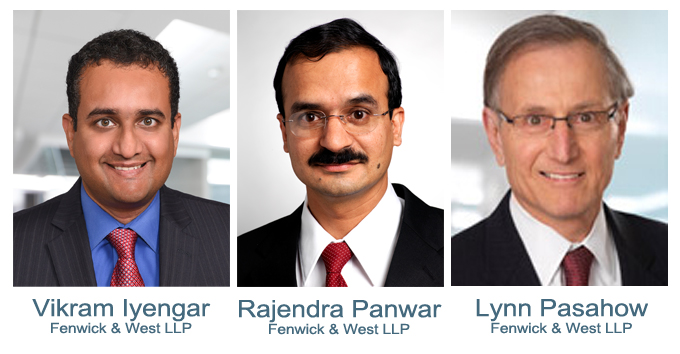
Rural Immigrant Connect is more than simply a means through which we can connect more Central American and Mexican refugees in the Central Valley with vital pro bono legal representation. This innovative project also provides us with a means of gathering data regarding the efficacy of videoconferencing to demonstrate a model that can be replicable throughout the U.S. A project like this can bridge the often daunting urban-rural divide separating many rural low-income communities from access to affordable legal services.
Rural Immigrant Connect is at its core a collaborative project that has only been made possible through incredible partnerships with legal services organizations Social Justice Collaborative and Centro Legal de la Raza; community organizations El Concilio and Centro La Familia; the law firm Fenwick & West LLP; and national organization Equal Justice Works. Thanks to the dedication of pro bono volunteers like Vikram and Rajendra, partnerships like those mentioned above, and the collaboration of the OneJustice network, we can work together to bring help, hope, and justice to individuals escaping the violence that continues to plague our neighbors in parts of Mexico and in regions of Central America.
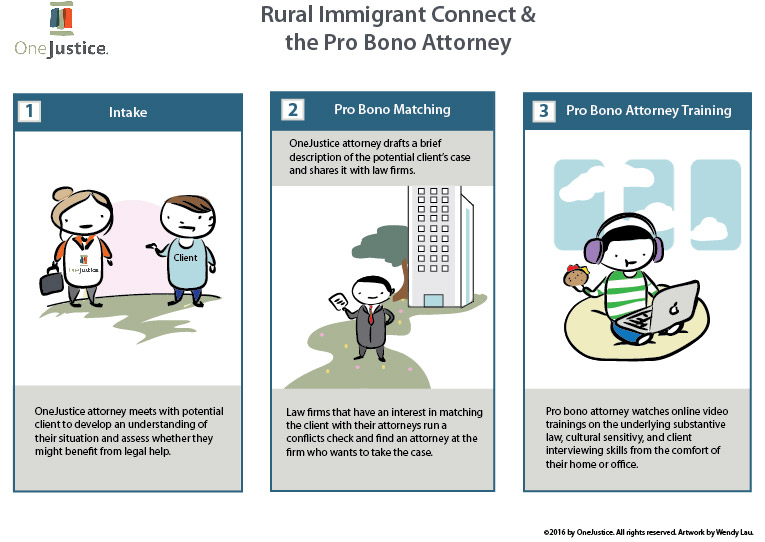
Image explaining to pro bono attorneys how Rural Immigrant Connect works.
To view the full infographic presented above, please click here.
 Renée Schomp is an Equal Justice Works Fellow sponsored by Fenwick & West LLP and Staff Attorney at OneJustice. She currently spearheads the Rural Immigrant Connect project in California’s Central Valley.
Renée Schomp is an Equal Justice Works Fellow sponsored by Fenwick & West LLP and Staff Attorney at OneJustice. She currently spearheads the Rural Immigrant Connect project in California’s Central Valley.
